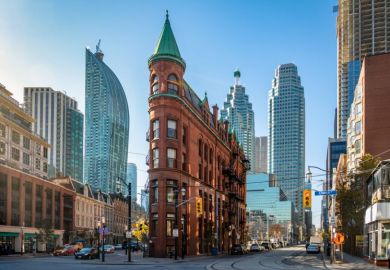Register for the THE World Academic Summit 2020
A leading scholar who has been described as the “godfather of deep learning” will join presidents of some of the world’s top universities among a prestigious line-up of speakers confirmed for the Times Higher Education World Academic Summit in September.
Geoffrey Hinton, distinguished emeritus professor at the University of Toronto and a researcher at Google Brain, who has led pioneering research on artificial intelligence, will speak at the event, which takes place from 1 to 3 September 2020.
Meanwhile, Ronald Daniels, president of Johns Hopkins University; Dame Nancy Rothwell, president and vice-chancellor of the University of Manchester; and Michael Spence, vice-chancellor and principal of the University of Sydney will discuss how world-class research universities produce world-class cities.
The summit, which will take place at the University of Toronto, will be on the theme “the power of place”. It will explore why place still matters in a globalised world, whether online learning is the answer to spreading educational opportunities and how branch campuses project power.
Michael Ignatieff, president and rector of the Central European University, which relocated to Vienna last year after being forced out of Budapest by the Hungarian government, will deliver a keynote speech on finding a new home, while Stephen Toope, vice-chancellor of the University of Cambridge, will explore to what extent universities are defined by their location.
Mamokgethi Phakeng, vice-chancellor of the University of Cape Town, will discuss whether digital technology is redefining universities’ boundaries.
The summit will also include an exclusive reveal of the THE World University Rankings 2021.
Tim Sowula, head of content and engagement for the THE World Summit Series, said the summit would help to tackle the challenges that universities face as a result of their dual role in society.
Universities have to both “direct their research on long-term global challenges, attracting and working with the best global talent available”, and “respond to the immediate needs and concerns of the community on their doorstep, paying attention to the local electoral cycle, the immigration policies of their host government, and the economic concerns of their public funders”, he said.
“By focusing on ‘the power of place’, this summit will bring together university leaders from across the globe to celebrate the impact of universities both near and far, question conventional wisdom about the contribution universities can make to their host communities, reveal what are the most important factors that can empower a research university, and examine what rebalancing the world’s higher education resources might look like now that we have a clearer picture of technological opportunities and the demographic and economic realities that this century will demand of universities.”
Phil Baty, THE’s chief knowledge officer, said: “Now perhaps more than ever before, universities across the world are facing extraordinary political and public scrutiny of their role and value to society – in particular with regard to their social and economic impact, including their relationship with the local communities they are part of. The rise of nationalism across the continents, campus culture wars and rows over free speech, populist challenges to the value of entire fields of academic research, and the need for major improvements to social mobility all combine to raise profound questions about how globally focused universities deliver public good – in their neighbourhoods and communities, as well as for the world at large.
“So the theme of the 2020 THE World Academic Summit, ‘the power of place’, could not be more timely or relevant to global higher education, and our host, the University of Toronto, as one of the world’s leading universities firmly rooted in its community, could not be better equipped to tackle these issues head-on.”
Register to continue
Why register?
- Registration is free and only takes a moment
- Once registered, you can read 3 articles a month
- Sign up for our newsletter
Subscribe
Or subscribe for unlimited access to:
- Unlimited access to news, views, insights & reviews
- Digital editions
- Digital access to THE’s university and college rankings analysis
Already registered or a current subscriber? Login







